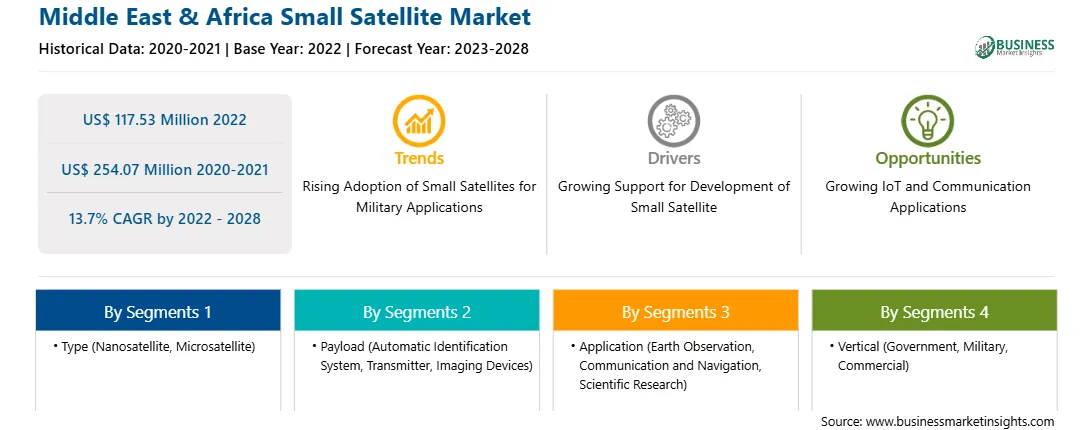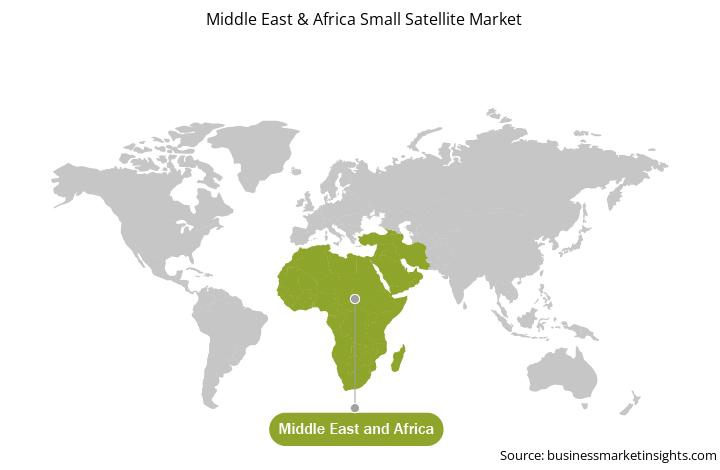Various government authorities and companies across the MEA have invested in the small satellite market owing to the increasing need for small satellites for various applications such as earth observation, communication and navigation, and scientific research. In November 2021, Fleet Space Technologies raised US$ 26 million in funds to expand the nanosatellite IoT connectivity fleet. Such investments from governments drive the growth of the small satellite market. The use of small satellites helps government authorities maintain national security, capture data regarding areas damaged by earthquakes or floods, monitor suspicious ships, and serve other purposes such as communication & navigation, earth observation, and scientific research operations. The governments of various countries are supporting the development of small satellites for earth observation. Under the project, the government announced that they would support the companies for quick construction and domestic production of a small satellite. Thus, the increasing initiatives for the development of small satellites fuel the growth of the Middle East & Africa small satellite market.
Based on country, the Middle East & Africa small satellite market is segmented into South Africa, Saudi Arabia, the UAE, and the Rest of the Middle East & Africa. The growth of the space industry in the Middle East & Africa is driven by collaborated investments in the industry by public organizations and original equipment manufacturers. The increasing demand for satellites for earth observation, communication, space mining, space exploration, and other applications is propelling the adoption of small satellites across the region.
Strategic insights for the Middle East & Africa Small Satellite provides data-driven analysis of the industry landscape, including current trends, key players, and regional nuances. These insights offer actionable recommendations, enabling readers to differentiate themselves from competitors by identifying untapped segments or developing unique value propositions. Leveraging data analytics, these insights help industry players anticipate the market shifts, whether investors, manufacturers, or other stakeholders. A future-oriented perspective is essential, helping stakeholders anticipate market shifts and position themselves for long-term success in this dynamic region. Ultimately, effective strategic insights empower readers to make informed decisions that drive profitability and achieve their business objectives within the market.

| Report Attribute | Details |
|---|---|
| Market size in 2022 | US$ 117.53 Million |
| Market Size by 2028 | US$ 254.07 Million |
| Global CAGR (2022 - 2028) | 13.7% |
| Historical Data | 2020-2021 |
| Forecast period | 2023-2028 |
| Segments Covered |
By Type
|
| Regions and Countries Covered | Middle East and Africa
|
| Market leaders and key company profiles |
The geographic scope of the Middle East & Africa Small Satellite refers to the specific areas in which a business operates and competes. Understanding local distinctions, such as diverse consumer preferences (e.g., demand for specific plug types or battery backup durations), varying economic conditions, and regulatory environments, is crucial for tailoring strategies to specific markets. Businesses can expand their reach by identifying underserved areas or adapting their offerings to meet local demands. A clear market focus allows for more effective resource allocation, targeted marketing campaigns, and better positioning against local competitors, ultimately driving growth in those targeted areas.

The Middle East & Africa small satellite market is segmented based on type, payload, application, vertical, and country.
Based on type, the Middle East & Africa small satellite market is bifurcated into nanosatellite (1 to 10 Kg) and microsatellite (10 to 150 Kg). The microsatellite (10 to 150 Kg) segment held a larger market share in 2022.
Based on payload, the Middle East & Africa small satellite market is segmented into automatic identification system (AIS), transmitter, imaging devices, and others. The automatic identification system (AIS) segment held the largest market share in 2022.
Based on application, the Middle East & Africa small satellite market is segmented into earth observation, communication and navigation, and scientific research. The earth observation segment held the largest market share in 2022.
Based on vertical, the Middle East & Africa small satellite market is segmented into government, military, and commercial. The commercial segment held the largest market share in 2022.
Based on country, the Middle East & Africa small satellite market is segmented into Saudi Arabia, South Africa, the UAE, and the Rest of Middle East & Africa. The Rest of Middle East & Africa dominated the market share in 2022.
Lockheed Martin Corp; Northrop Grumman Corp; Raytheon Technologies Corp; and Thales SA are the leading companies operating in the Middle East & Africa small satellite market.
The Middle East & Africa Small Satellite Market is valued at US$ 117.53 Million in 2022, it is projected to reach US$ 254.07 Million by 2028.
As per our report Middle East & Africa Small Satellite Market, the market size is valued at US$ 117.53 Million in 2022, projecting it to reach US$ 254.07 Million by 2028. This translates to a CAGR of approximately 13.7% during the forecast period.
The Middle East & Africa Small Satellite Market report typically cover these key segments-
The historic period, base year, and forecast period can vary slightly depending on the specific market research report. However, for the Middle East & Africa Small Satellite Market report:
The Middle East & Africa Small Satellite Market is populated by several key players, each contributing to its growth and innovation. Some of the major players include:
The Middle East & Africa Small Satellite Market report is valuable for diverse stakeholders, including:
Essentially, anyone involved in or considering involvement in the Middle East & Africa Small Satellite Market value chain can benefit from the information contained in a comprehensive market report.